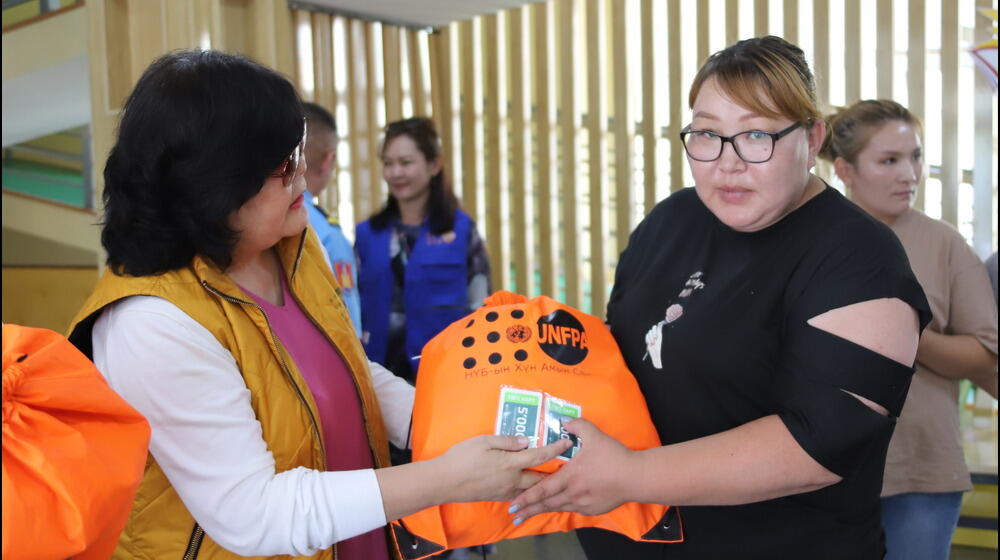Ulaanbaatar, August 15, 2023 - UNFPA has delivered 200 dignity kits and phone top-up cards to women and girls that are affected by the floods that have been besieging the capital city Ulaanbaatar since July.
On 5 August 2023, Ulaanbaatar faced yet another heavy rainfall, which flooded 41.4 hectares of land of the 21st, 27th and 29th khoroos of the Bayanzurkh district.
In total, the floods recorded 4 casualties, injured 13 people, flooded 554 household’s homes, 25 private sectors and 105 vehicles. The total affected population at this time was 1,310 (577 children, 709 adults, 24 PWD), of which a total of 103 people (22 HH) completely lost their homes.
As of 8 August, the total estimated number of affected people in Bayanzurkh district were 1,430 of which 108 are elderly, 27 PWD and 609 children. The total estimated number of households affected is 360.
UNFPA used the Minimum Initial Service Package (MISP) calculator to estimate the number of women in reproductive age, number of pregnant women and number of adolescents’ girls that might be affected by this disaster at Ulaanbaatar city.
Among 1430 people of Bayanzurkh district, it is estimate to have 372 women of reproductive age, 100 adolescents’ girls age 10-19 years old, and 23 pregnant women.
Protection risks for women and girls are likely to increase due to the destruction of homes, water, sanitation and hygiene facilities, and lighting facilities due to frequent power outages. Women and girls who are displaced in temporary, overcrowded shelter sites are particularly vulnerable. In addition, resources are scarce, which could lead to an increase in negative coping mechanisms and sexual exploitation and abuse.
Communication channels including phone lines and internet are not fully functional, making remote service provision through helplines challenging.
UNFPA's distribution of 200 dignity kits, an integral facet of our humanitarian support, serves to reclaim a sense of dignity and well-being for the impacted women and girls. These meticulously designed kits encompass indispensable hygiene provisions, personal care essentials, and menstrual health supplies. The comprehensive package significantly contributes to preserving their health, self-esteem, and dignity amidst the exigencies of the crisis.
The dignity kits to women and girls in the most affected khoroo of Bayanzurkh district were distributed, using the support of the local Emergency Management and Red Cross branches.
Methodologist Soyoloo from the Bayanzurkh District branch of the Red Cross Society underscored the profound significance of this support, stating that "Most of the individuals seeking refuge in temporary shelters are women and girls. The availability of sanitary and hygiene products has been an acute need and their provision through the dignity kits is both commendable and indispensable". She elaborated further, revealing, "In instances, we encounter requests for menstrual pads from women and girls who are left with nothing but the garments they wore when the floods struck. These kits provide vital relief."
Moreover, recognizing the pivotal role assumed by emergency responders in disaster management, UNFPA is augmenting their efforts through the provision of phone top-up cards. These cards facilitate sustained communication amongst emergency responders.
UNFPA remains steadfast in its commitment to supporting the people of Ulaanbaatar during this emergency period. Our collaboration with local authorities, partners, and organizations persists, ensuring the fulfillment of the humanitarian needs of the affected communities, in particularly protecting dignity of women and girls and preventing them from GBV.


